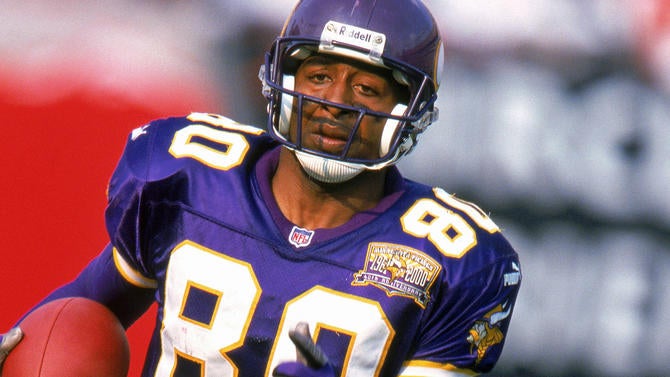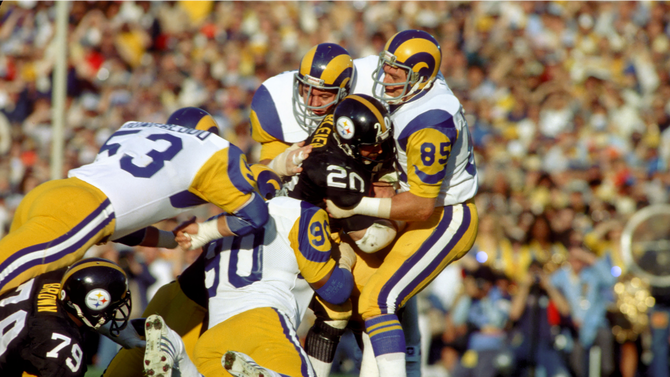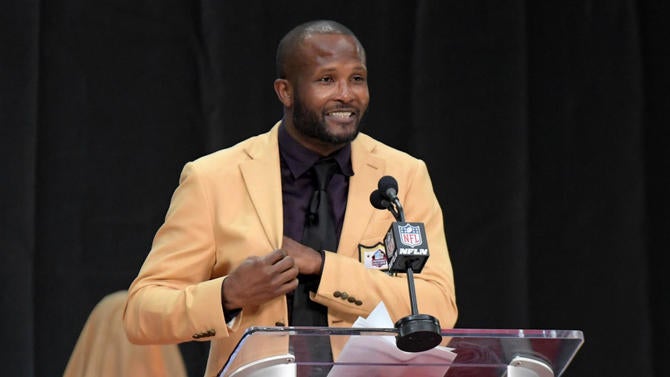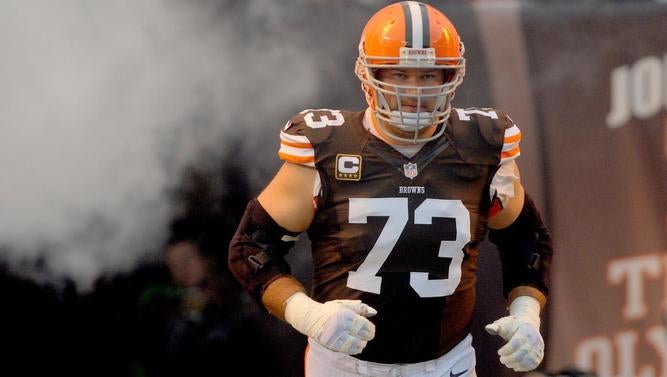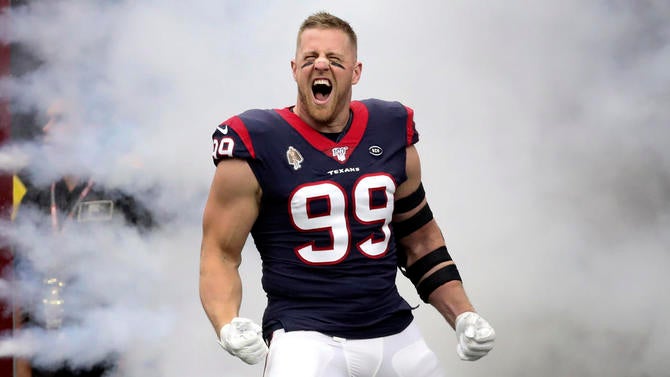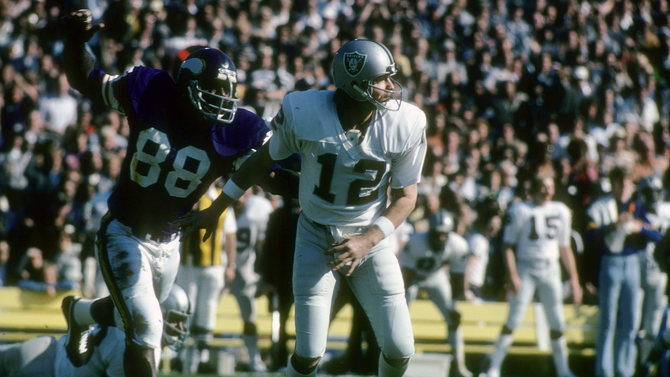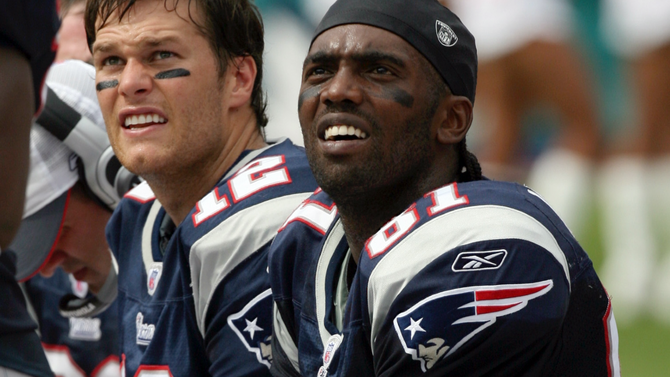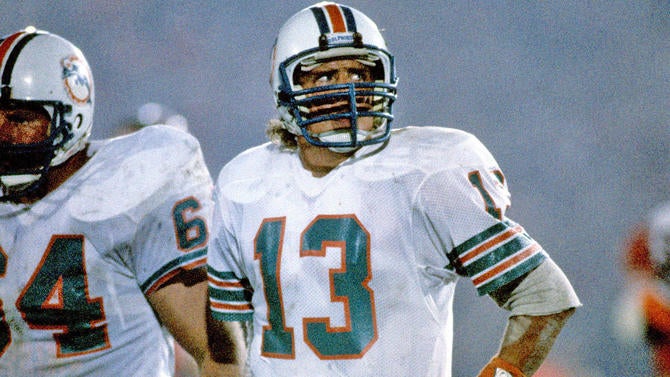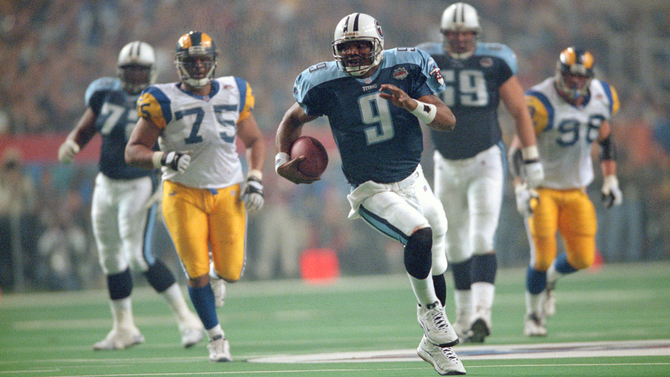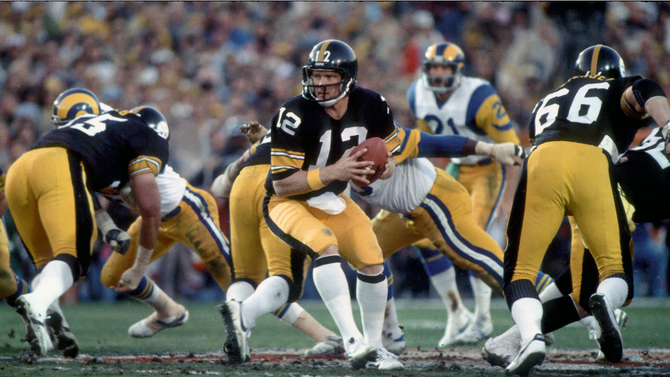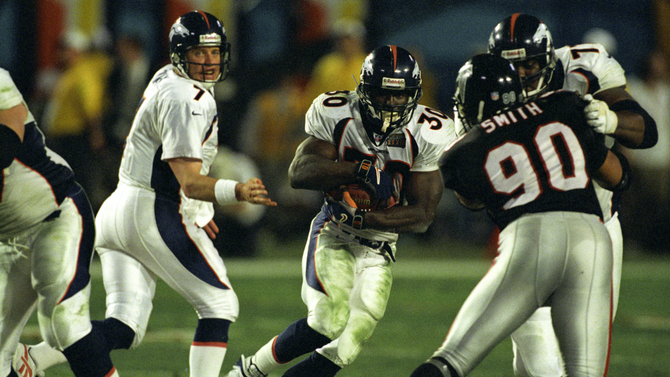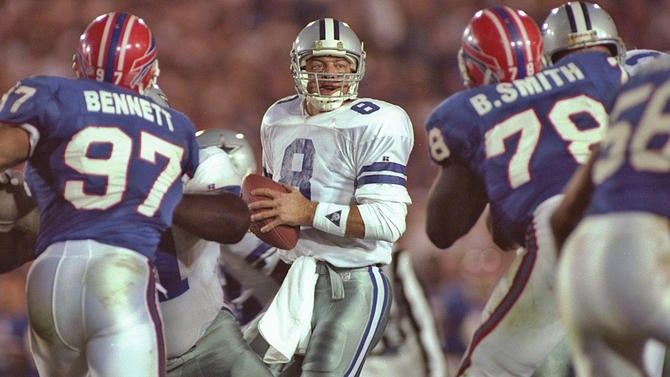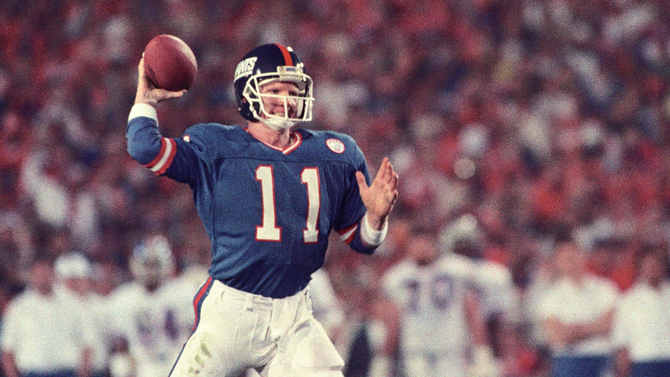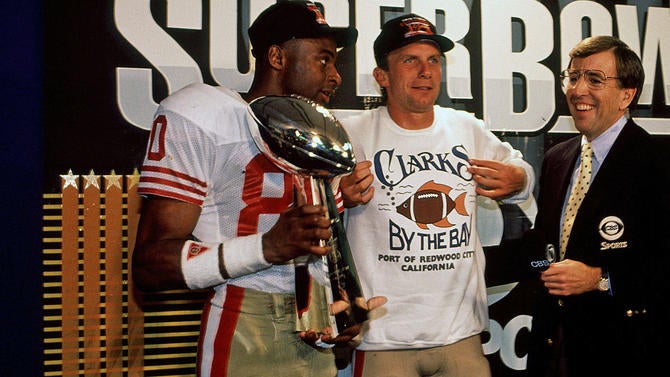Since the Green Bay Packers and Kansas City Chiefs faced off in Super Bowl I in 1967, thousands of players have taken part in the Super Bowl. Several of those players became household names by virtue of their performance in the big game. Tom Brady, Joe Montana and many others etched their name in football lore after leading their teams to victory multiple times.
With Super Bowl LVIII just around the corner, we decided to take on the task of creating an all-time, 53-man roster comprised of some of the best players in Super Bowl history. The construction of our roster included the following criteria:
- Super Bowl MVPs weighed heavily
- Multiple Super Bowl appearances are an advantage
- Did their performance significantly contribute to the success of their team?
- Was their performance critical to the outcome of the game(s)?
Choosing performance over a specific player also played a role in the building of the roster. Yes, being a big name certainly doesn’t hurt, but this is not a roster of the biggest names that have played in the Super Bowl. If that was the case, Walter Payton, arguably the greatest running back in NFL history, would have made the list.
Without further ado, let’s take a look at the all-time, 53-man Super Bowl roster, with a practice squad to boot.
Offense
| Position | Starter | Backup | Depth |
|---|---|---|---|
QB | Tom Brady | Joe Montana | Terry Bradshaw |
RB | Emmitt Smith | Terrell Davis | |
FB | Franco Harris | ||
LWR | Jerry Rice | Cliff Branch | |
RWR | Michael Irvin | John Stallworth | |
SWR | Lynn Swann | Julian Edelman | |
LT | Art Shell | Orlando Pace | |
LG | Gene Upshaw | Nate Newton | |
C | Mike Webster | Tom Nalen | |
RG | Larry Little | Mark Schlereth | |
RT | Forrest Gregg | Anthony Munoz | |
| TE | Rob Gronkowski | Travis Kelce |
Quarterbacks: Tom Brady, Joe Montana, and Terry Bradshaw are a combined 15-3 in Super Bowl competition, with 10 MVP trophies to boot. Brady currently holds the Super Bowl single-game passing record (505 yards), a record that had been previously held by both Montana and Bradshaw. Brady’s greatest Super Bowl moment may have been his first one when he led the Patriots past the heavily-favored Rams in Super Bowl XXXVI. Montana’s signature Super Bowl moment took place in Super Bowl XXIII, when he led the 49ers on a 92-yard, game-winning drive that was capped off with his game-winning pass to John Taylor. A decade earlier, Bradshaw threw for then-Super Bowl records 318 yards and four touchdowns in Pittsburgh’s 35-31 win over Dallas.
Running backs: The MVP of Super Bowl XXVIII, Emmitt Smith is the Super Bowl’s all-time leader in rushing touchdowns. Franco Harris, who took home MVP honors in Super Bowl IX, is the Super Bowl’s career rushing leader with 354 yards. Terrell Davis tallied 321 yards and three touchdowns in Denver’s back-to-back Super Bowl wins. His 157 yards and three touchdowns in Super Bowl XXXII helped Denver upset the defending-champion Packers to end the NFC’s run of 13 consecutive Super Bowl wins.
Receivers: Jerry Rice is the Super Bowl’s all-time leader in catches (28), yards (589) and touchdowns (8). His 215 receiving yards in Super Bowl XXIII is still the single-game record. Flanking Rice in the starting lineup is Super Bowl X MVP Lynn Swann, who caught 16 passes for 364 yards and three touchdowns in his last three Super Bowls.
Also cracking the starting lineup is former Cowboys receiver Michael Irvin, who caught 16 passes and two touchdowns in three Super Bowl wins. Stallworth caught a combined six passes for 236 yards and three touchdowns in Super Bowls XIII and XIV. Cliff Branch caught three Super Bowl touchdowns while helping the Raiders win three rings in a seven-year span. Julian Edelman caught 24 passes for 337 yards in New England’s three most recent Super Bowl wins. He was named Super Bowl LIII MVP after catching 10 passes for 141 yards. Edelman also made several clutch catches in the Patriots’ Super Bowl wins over the Seahawks and Falcons.
Tight ends: Rob Gronkowski caught 21 passes for 271 yards and three touchdowns in his three Super Bowl wins in New England. He caught two touchdown passes from Brady in Tampa Bay’s 31-9 win over Kansas City in Super Bowl LV. In three Super Bowls, Kelce has caught 22 passes for 257 yards and two scores. He led the Chiefs with 81 yards and a touchdown on six catches in Super Bowl LVII.
Offensive line: You’d be hard-pressed to find a better offensive line than this one. Art Shell and Gene Upshaw anchored a powerful Raiders offensive line that had their way against the Vikings and Eagles in Super Bowls XI and XV. Mike Webster started in three of the Steelers’ four Super Bowls during the ’70s. Larry Little and Forrest Gregg both won back-to-back Super Bowls as members of the Dolphins and Packers, respectively. Little helped pave the way for Larry Csonka, Mercury Morris and Jim Kiick in three straight Super Bowls. One of the key cogs in Vince Lombardi’s legendary Packers sweep, Gregg helped Green Bay win the first two Super Bowls and three straight NFL titles.
Orlando Pace protected Kurt Warner’s blind side during both of his Super Bowls with the Rams. Newton helped plow open running lanes for Emmitt Smith. Tom Nalen and Mark Schlereth won a combined five Super Bowls that included two rings as teammates in Denver. In losing efforts, Anthony Munoz played well in the Bengals’ two Super Bowl matchups with the 49ers.
Defense
| Position | Starter | Backup | Depth |
|---|---|---|---|
DE | Reggie White | Richard Dent | |
DT | Joe Greene | Alan Page | Manny Fernandez |
| NT | Reggie Kinlaw | ||
DT | Aaron Donald | Randy White | |
DE | Bruce Smith | L.C. Greenwood | |
OLB | Lawrence Taylor | Charles Haley | |
ILB | Jack Lambert | Mike Singletary | |
ILB | Ray Lewis | Derrick Brooks | |
OLB | Von Miller | Jack Ham | |
CB | Mel Blount | Lester Hayes | |
CB | Herb Adderley | Deion Sanders | |
| FS | Ronnie Lott | Willie Wood | |
| SS | Ed Reed | Donnie Shell |
Defensive line: This group is as good as it gets. Reggie White, who retired as the NFL’s career sack leader, tallied three sacks in Green Bay’s win over New England in Super Bowl XXXI. Joe Greene was the anchor of four Super Bowl championship defenses in Pittsburgh. His interception and fumble recovery in Super Bowl IX helped the Steelers become the second team to shut out an opposing offense in the Super Bowl. Randy White’s dominance in Super Bowl XII earned him co-MVP honors.
Richard Dent’s 1.5 sacks and two forced fumbles earned him MVP honors in Super Bowl XX. Bruce Smith, Alan Page and L.C. Greenwood each played in four Super Bowls. Smith recorded a safety in Super Bowl XXV, while Greenwood’s three deflected passes helped neutralize Frank Tarkenton in Super Bowl IX. A year later, Greenwood sacked Roger Staubach three times in Pittsburgh’s 21-17 win over Dallas. Manny Fernandez recorded a whopping 17 tackles while leading Miami’s “No Name” defense in Super Bowl VII.
Aaron Donald became the only active player to make the roster after leading the Rams to a comeback win over Cincinnati in Super Bowl LVI. Donald, who helped hold the Patriots to 13 points in Super Bowl LIII, had two sacks of Joe Burrow along with his crucial pressure on Cincinnati’s final play that prevented Burrow from finding Ja’Marr Chase downfield.
The defensive line’s lucky charm is its least-known member. In Super Bowls XV and XVIII, Reggie Kinlaw wreaked havoc on Philadelphia and Washington. With Kinlaw plugging the middle, the Raiders’ defense held Wilbert Montgomery and John Riggins (the MVP of the previous year’s Super Bowl) to a combined 110 yards on 42 carries (a 2.62 yards per carry average).
Linebackers: A player who revolutionized the linebacker position, Lawrence Taylor’s tackle of John Elway in Super Bowl XXI was part of a crucial goal-line stand by the Giants. Jack Lambert played big in each of Pittsburgh’s four Super Bowl wins during the ’70s. His 14 tackles in Super Bowl X led both teams. In Super Bowl XIV, his fourth-quarter interception set up the Steelers’ game-clinching score.
Ray Lewis, the MVP of Super Bowl XXXV, won two Super Bowls with the Ravens. Jack Ham’s quickness and savviness helped the Steelers dominate opposing rushing attacks. En route to becoming the first player to win five Super Bowls, Charles Haley recorded 4.5 sacks for the 49ers and Cowboys. In Super Bowl XXVII, his sack/forced fumble of Jim Kelly set up a touchdown by teammate Jimmy Jones, as Dallas took the lead for good. Mike Singletary and Derrick Brooks presided over legendary defenses. Von Miller’s 2.5 sacks and two forced fumbles in Super Bowl 50 earned him Super Bowl MVP honors. He had two more sacks in the Rams’ Super Bowl win over Cincinnati.
Secondary: Mel Blount, whose physical dominance over receivers ushered in new league rules, picked off two passes in Super Bowl play. In Super Bowl XIII, his second-quarter interception set up the Steelers’ go-ahead touchdown. Herb Adderley, who won Super Bowls with the Packers and Cowboys, had a 60-yard pick six in Green Bay’s win over Oakland in Super Bowl II. Safety Ronnie Lott led the 49ers to their first Super Bowl win as a rookie. Seven years later, his jarring hit of Bengals running back Ickey Woods helped set the tone for the 49ers’ victory. Lott is flanked by Ed Reed, who recorded an interception in his only Super Bowl appearance.
Lester Hayes, the 1980 Defensive Player of the Year, won his second ring after shutting down Washington’s talented receiving corps in Super Bowl XVIII. Willie Wood, Adderley’s teammate on those legendary Packers defenses, recorded a game-changing interception during the second half of Green Bay’s win over Kansas City in Super Bowl I. A stabilizing force in the Steelers’ secondary, Donnie Shell’s clutch tackle in Super Bowl XIV prevented an early Rams touchdown.
Ironically, Sanders’ best play in a Super Bowl was his 47-yard catch in Super Bowl XXX that set up the Cowboys’ first touchdown.
Special teams
| Position | Starter | Backup |
|---|---|---|
LS | Mike Webster | |
K | Adam Vinatieri | |
P | Ray Guy | |
| KR | Desmond Howard | Deion Sanders |
| PR | Deion Sanders | Lynn Swann |
A four-time champion, Adam Vinatieri made two game-winning field goals with the Patriots. Ray Guy, the only punter who resides in the Hall of Fame, saved a potential disaster when he made a one-handed catch following a high snap in Super Bowl XVIII. Desmond Howard, the only special teams player to win Super Bowl MVP, returned a kickoff 99 yards for a touchdown in Green Bay’s 35-21 win over New England. Howard also tallied 90 yards on punt returns.
Practice squad
- CB Richard Sherman
- RB Larry Csonka
- WR Paul Warfield
- OT Winston Hill
- DT Warren Sapp
- DT/DE Richard Seymour
- LB Willie Lanier
- LB Chuck Howley
- LB Nick Buoniconti
- FS Jake Scott
Super Bowl LVIII goes down Feb. 11 on CBS. The game will also be broadcast on Nickelodeon and streamed on Paramount+.




